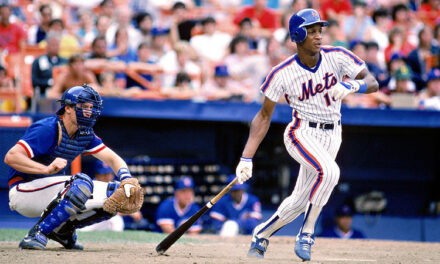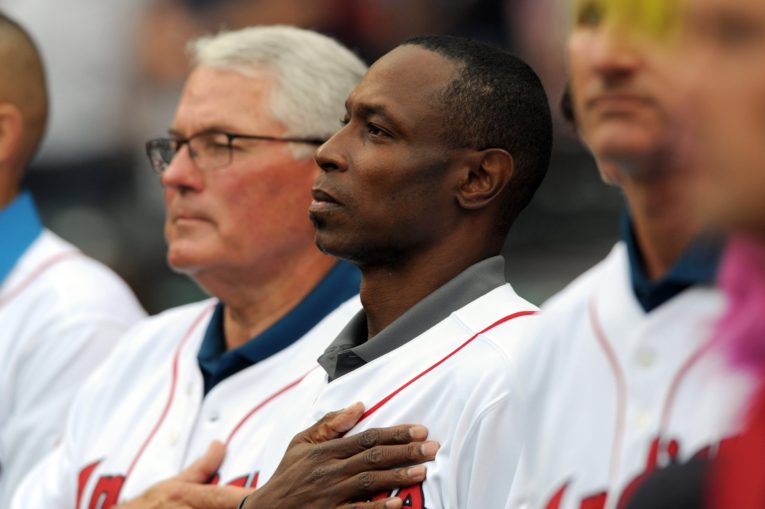
In major league history, there’s been only been eight players to accomplish the following for their careers:
- Collect 2,400 or more hits
- Steal 600 plus bases
- Own a career bWAR (Baseball-Reference WAR) of 65.0 or greater
Seven of the eight players are enshrined in Cooperstown in the Baseball Hall of Fame: Honus Wagner, Ty Cobb, Eddie Collins, George Davis, Joe Morgan, Tim Raines and Rickey Henderson.
The eighth member? A man who was a six-time All-Star, four-time Gold Glove winner and owns the ninth-best bWAR among all-time center-fielders: Kenny Lofton.
Lofton, 50, established himself as one of the premier base-stealers and table setters of his generation, eclipsing the 50 stolen base mark six times in his seventeen-year career while getting on-base at a career .372 mark, which helped ignite many of those Cleveland Indians’ offenses.
His propensity for getting in scoring position with his speed on the bases was a thing of beauty. When comparing Lofton with Hall of Fame speedsters and fellow leadoff hitters in Rickey Henderson and Tim Raines, it’s not hard to see the comparisons between three of the very best in their productivity.
When examining extra bases taken, which identifies the percentage of time the runner advanced more than one base on a single or more than two bases on a double, Lofton and Henderson are tied at 55 percent, while Raines sits at 50 percent.
In terms of productive outs percentage, which looks at the number of times a batter advanced a runner with no outs or drove in a base-runner with the second out of the inning, Raines leads by one percentage point with 39 percent, followed by Lofton at 38 percent, and Henderson at 31 percent.
Looking at bWAR, Lofton’s career 68.2 trails Raines by the slimmest of margins, with Raines posting a 69.1 over nearly 400 more games played in his career. Their runs created per game, which can be looked at as the runs produced by a lineup of nine of that particular player, appear very close to one another, with Henderson leading the pack at 6.8, followed by Raines at 6.6, and Lofton at 6.1.
The puzzling aspect when researching Lofton’s career numbers is the fact that when his first year of Hall of Fame eligibility arrived in 2013, the Baseball Writers’ Association of America (BBWAA) only voted for Lofton 3.2 percent of the time, which meant falling off the ballot entirely.
For Lofton, not getting the proper recognition, and at least staying above the five percent threshold to continue to have his numbers looked at by the voters, harbors frustration and confusion. Playing in the steroid era, Lofton concedes that his overall numbers might be overlooked due to the inflated home run and runs batted in stats, though, he remains humble in the fact that he got to be a catalyst for many winning teams and enjoyed setting the table for the lineups he was in.
In total, Lofton played for eleven teams in his seventeen-year major league career, compiling a line of .299/.372/.423 with 2,428 hits, 1,528 runs, 116 triples, and 622 stolen bases.
Lofton has kept busy post-baseball, as he co-founded a film production company in 2004 called FilmPool Inc. While at the University of Arizona on a basketball scholarship, Lofton majored in TV/Film and has always had a burgeoning passion for film production.
Lofton and his team are currently finishing up their third feature film, and his appetency for creating projects with meaningful messages is something Lofton takes great pride in.
I had the privilege of speaking with the speedster in early-December, where we discussed his time at the University of Arizona, his tenure with the Indians and his thoughts on his Hall of Fame candidacy.
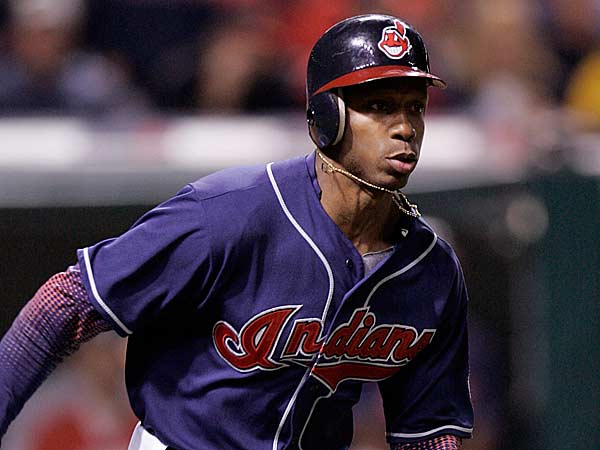
MMO: Growing up, who were some of your favorite players?
Kenny: I was a Cubs fan. I grew up in the Chicago area and coming home from school at 2:30 PM the Cubs were always on TV.
MMO: You received a basketball scholarship to the University of Arizona, where you were the backup point guard. Can you talk a little about your experience there? How did you eventually end up playing baseball for the Wildcats?
Kenny: I was there on a basketball scholarship so I went to Arizona. It was a great experience. I enjoyed the time I was there and I ended up just working out with the baseball team after my junior year, and that was kind of it.
I didn’t play, I played in one game or something like that. I was there around three weeks and that was it. I end up getting signed and playing baseball.
MMO: So scouts were intrigued by your speed and athleticism?
Kenny: Yeah, that’s pretty much what it was. They saw my speed and just working out with the team. I went to some practices, worked out, and I had one official at-bat.
A scout named Clark Crist, I think he’s with the Diamondbacks right now, but he was with the Houston Astros and he had an eye for the game, and he was the guy who knows talent. I guess he saw me and said hey, we need to try and get this guy.
MMO: Were you more of a basketball fan growing up, or was your love for baseball about even?
Kenny: I think I was a little even. Younger, I was more baseball, and as I got a little older in high school and all the accolades and attention was on basketball. Growing up in the Chicago-Indiana area, it was all basketball. It was all Hoosiers, Chicago basketball and that’s what that was all about.
MMO: Your major league debut on September 14, 1991: You went 3-for-4 with a double, walk and three runs scored out of the leadoff spot. What do you remember most from that day?
Kenny: It was kind of a blur, but again, it went all downhill from there. [Laughs.] I had a great day, it was Randy Myers, a left-handed starter for the Reds. I got a hit off of Randy Myers and I got a hit off of Rob Dibble.
It was just a great experience. Laughing at Barry Larkin who was seeing how fast I was on the field and he was shocked! I ended up facing [Jose] Rijo the next day; it was pretty funny watching him on the mound.
It was just a good experience of being in the big leagues and seeing that this was what everyone was talking about being in the big leagues.
MMO: What were your initial reactions when you learned you had been traded to Cleveland in December of 1991?
Kenny: I didn’t know. For me, just starting really early in the game and trying to understand the game and knowing at that time Cleveland was in last place and Houston was in last place. I had two teams; I went from one last-place team to another last-place team.
I just wanted to play and I mean, I was kind of disappointed not being able to play on that AstroTurf forever with my speed. But again, I just wanted to play. Once Houston let me go I was like, ‘You know what? I get a chance to play every day, and that’s what I want.’
MMO: I read that your former first base coach with Cleveland, Dave Nelson, was extremely influential in helping you with your base stealing and bunting, is that true?
Kenny: Oh, he was! I mean, he showed me a lot of the techniques, a lot of the nuances of what to look for as a base-stealer. He didn’t teach me how to run the bases, but he pretty much had me look at and use my aggressiveness and understand with being aggressive and knowing the little keys of base stealing and running the bases.
I think the biggest thing he taught me was to be prepared. Every time you’re at the plate, understand where everyone is, and when you get on the bases it’s the same thing. You’ve got to understand who the pitcher is, who the catcher is, where the outfielders are and then base running and understanding [it all].
He was big on preparation. If you could prepare the game beforehand, it makes it easier on the field. He was very good at preparation.
MMO: What are your memories from your Cleveland tenure from 1992-96, 98-01? (Lofton played in Atlanta in 1997, and also returned to Cleveland in his final season of 2007).
Kenny: We were just a very aggressive team and we had confidence in who we were as players and teammates. I think one thing with Charlie Manuel, who was over there with us, he basically told guys know thy self. Know who you are as an individual and you put your individual talents together it will help the team.
He always said, “Kenny, don’t try to be Albert Belle.” And tell Albert Belle don’t try to be Kenny Lofton. Charlie had that thing always. He told Jim Thome to be who you are and if you are who you are, you’re going to be very successful. He looked at it that way.
MMO: Basically, know and utilize your personal strengths?
Kenny: Yeah, know what your strengths are and use those strengths to your advantage.
MMO: You were teammates with some of the most dynamic hitters of our generation in Cleveland. Can you talk a bit about three in particular in Manny Ramirez, Albert Belle and Jim Thome?
Kenny: I think with that team, again, we knew who we were as individuals and we always wanted to win. We knew what our strengths were and I think just understanding our roles on the team. I felt like if I got on base with those guys behind me a lot of things could happen.
I think with Thome and Manny early on, they were towards the bottom of the lineup. The lineup was so strong with those guys, it was interesting just to see up and down the lineup how powerful we were as a team because of the strength throughout. Then you could see as those guys got older, other players started to move on and those guys start to move up in the lineup and became very successful.
MMO: I heard that Belle liked the clubhouse cold, and would constantly turn down the thermostat. One day, someone kept turning it back up. Eventually, Belle took a bat and broke the thermostat. Is that accurate?
Kenny: That is a true story. Albert was always burning up. And again, that’s who Albert was. For some reason, he liked the clubhouse cold, and no one else did.
But, that’s Albert.
MMO: And is that why his nickname was Mr. Freeze?
Kenny: That’s why they called him Mr. Freeze.
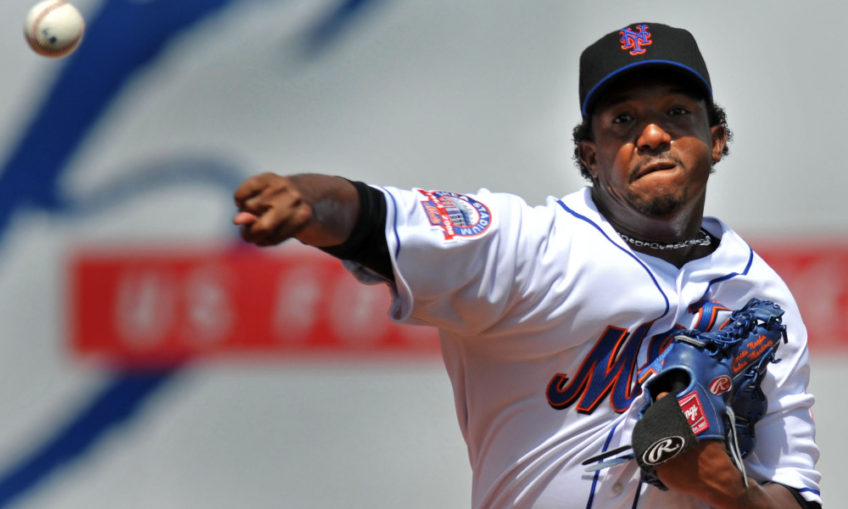
MMO: One pitcher that you had particularly good success against was Hall of Famer Pedro Martinez. You went 20-for-58 (.345) against him in your career. Why do you think you hit so well against him, and did you have a specific game plan when facing him at the plate?
Kenny: I had a game plan throughout my whole career. You had to look at the pitcher’s strengths and look at your strength. A pitcher is going to try and throw to your weakness, but again you’ve got to look at your strengths, and I call it a cat and mouse game.
I knew what Pedro’s best pitch was and I knew what he tried to do to get you out. It’s that preparation that I always talk about and I was always prepared when I got to the plate on certain pitchers. There were just certain pitchers that you were comfortable with and Pedro was very good at. Not using the word intimidating guys, but Pedro was more about guys moving their feet.
He knew how to get you off the plate to get you out of your comfort zone. But he could never get me out of my comfort zone because I went right back there. I just hung in and stuck it out, and said, if you’re going to throw it inside, bring it inside. Pedro’s best pitch was that changeup away. For me, he tries to throw the ball way in to make me move off the plate, to make his changeup on the outside very effective. And I didn’t care. I was like, if you’re going to keep throwing at me inside, I’m just going to get out the way and I’m going to move right back on top of the plate.
A lot of guys didn’t do that. A lot of guys saw him throw in, and [I’m] not saying they were scared, but they just felt like, okay, let me move back off the plate because he keeps throwing the ball way inside.
MMO: Adversely, was there a guy that you hated facing?
Kenny: People always say Randy Johnson, he didn’t really have my number. I just needed to figure out when he was going to throw the ball over my head and then after that, I was more comfortable.
A guy who was very tough to face was Al Leiter, I say it all the time. He threw a 94-mile-per-hour cutter and then he threw a 94-mile-per-hour sinker. As a lefty hitter, I didn’t know which way that ball was going to go. So it made it very tough for me to try and figure him out.
MMO: Did you have a favorite ballpark?
Kenny: I liked Yankee Stadium, they called me the Yankee Killer. I would do well against the Yankees.
MMO: You were eligible for the Hall of Fame in 2013, and received just 3.2 percent of the vote. Personally, I think your numbers merit major consideration for the Hall. What are your overall thoughts on your candidacy?
Kenny: I was disappointed that I wasn’t able to stay on the ballot to have my numbers looked at and compared against every single year. And again, for me to be on the same ballot with the steroid guys kind of affected me because you had these reporters trying to figure out if they want to vote for a guy that’s on steroids.
I was disappointed because that’s wrong; guys cheated the game. You cheat the game expecting to be rewarded and honored, I don’t like people who do something bad and are supposed to be rewarded. I’m about if you do something right you get rewarded, you do something bad you don’t get rewarded. For you to disrespect the game you are disrespecting every player and everyone who’s involved.
That pissed me off that I had to be on the same ballot of steroid people in which they cheated and I didn’t, and my numbers got overlooked.
I had to compete but also I look at it as my numbers competing with the guys who are on steroids, I stack right up with them. But again, they don’t talk about that. I had to face pitchers who were using steroids, I had to compete against players who, just say outfielders, they compare me to but they’re on steroids and I’m not. I think I just got the bad end of the stick and it’s not fair.
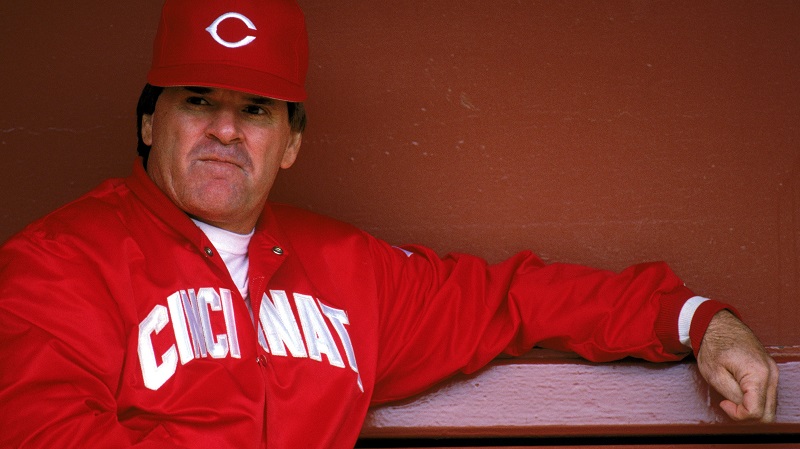
MMO: Going forward, do you believe the writers shouldn’t vote for any admitted or rumored steroid user?
Kenny: I mean, that’s not up to me. They have to do what they want to do.
Pete Rose should be in the Hall of Fame if you’re going to use what they did or whatever. He has the best numbers ever. But again, he did something wrong and he’s paying the price for it. These other guys did something wrong, they should pay the price. They shouldn’t get rewarded and say, okay, we can still put them on the ballot. They should be off the ballot. But that’s not on me.
MMO: Talk about how you started Film Pool Inc. I know you had majored in TV/Film at Arizona, was film and production always a passion of yours?
Kenny: That was always a passion of mine. I got my degree at Arizona in TV/Film and having the opportunity to get into the business. A friend of mine introduced me to my now business partner named Brenton Earley, and he had a vision of having his own company and wanting his own thing. A friend of mine said, “Hey, I know a guy who’s a friend of mine and trying to start his own [company], and you’re trying to do your own. Why don’t you guys hook up and see if you got some synergy?”
We talked and had a good conversation. The next thing you know, we end up going into business together and getting our own company named FilmPool Inc. This year we are on the brink of finishing our third feature film, a small budget film called Chokehold.
Chokehold is a woman’s underground MMA fighting movie. It’s pretty cool! It’s an underground mobster-type film.
The second film we had is called, My First Miracle. That’s on DVD, Vudu, iTunes, and I think I put it on Twitter and Facebook. It’s a story about a girl who has a rare form of cancer. We’re trying to get people to understand how important cancer is but also this is a form of cancer that you can only get cured from by a certain type of bone marrow.
Since the girl was multiracial, it was very tough for her to find that match because a lot of people who are multiracial are not registering in the system. You see how important it is if you’re multiracial to at least go into the system as a multiracial possible donor, it’ll help people who are multiracial.
Rod Carew’s daughter, I’ve talked to him about it when we were approaching to do the film, one of his daughters died from it. It’s called Myelodysplastic Syndrome. It’s the form of cancer and they couldn’t find a match, she was multiracial and they couldn’t find a bone marrow match for her. It was years ago but I talked to him before we did the film and I told him we were doing a film. He was thankful that people were trying to get awareness of this type of cancer that took his daughter so early.
MMO: It seems that many of the films you’ve produced have very deep messages and hope to raise awareness of certain causes. Is that something you were looking to go for?
Kenny: For me, it’s very important. We also have another film called The Fix, and it’s out right now on UMC, the Urban Movie Channel. A lot of stuff is about women being in power and empowerment for women.
It’s not like we did it on purpose. But once we saw those heartfelt films, we felt like women are important in this world. You see a whole lot going on now that women are important and they’re empowered and they are.
I always say your mom, grandma and aunt are the backbones of a family, so we have to keep praising them and making them feel how important they are. It just happens that these films are very empowering for women.
MMO: Were there any directors you admired growing up that gave you inspiration?
Kenny: I was always a Steven Spielberg fan. Understanding the special effects behind it and just being in the film and seeing how special effects work and how it all breaks down, it’s pretty cool.
He was an inspiration of mine to see behind the scenes and see how it all goes down, and to see how a well planned [idea] comes together and gets on the screen.
MMO: During your career, you were a guy that was viewed as a major catalyst and a winner. When you look back, how important is that distinction to you?
Kenny: They say hindsight is 20/20. I look back at it and I say right now it seems like for me, going to different teams, it seemed like it affected me Hall of Fame-wise. If you want to try and get into the Hall of Fame, you want to put up numbers, and they’re kind of looking at he played with all of these teams.
I felt like what I did as a leadoff hitter and catalyst a lot of teams didn’t have. Everyone was going out looking for that type of player. It happened to be once the business side of baseball kind of changed other teams looked at it as, okay, he can’t stick with this team we’re going to need this type of player on my team. I end up jumping from team to team, but I felt like what I did was very unique. A lot of guys didn’t like to do what I did.
I’m not sure how that affected me, but I felt like I was a winner. When I brought what I did to the table, I felt like it went a long way. Teams didn’t have that because again, I remember what Sandy Alomar said to me years ago, “Kenny, when you go, we go.” That was the word from the clubhouse that Sandy started, he said, “Kenny, you go, we go.” Because once I go and set the table, everyone else behind me follows suit.
When I went to Chicago, Eric Karros said the same thing: “Kenny, you go, we go.” In San Francisco the same thing. It’s like they all see what I bring to the table because that’s what I do.
MMO: I wish the voters would put a stronger emphasis on guys like yourself, who helped set the table early and utilized your speed to score runs. Your numbers overall illustrate what a productive player you were at the plate, on the base paths, and on defense.
Kenny: I do too. I’m glad Tim Raines got in because now that gives me an opportunity to show that they’re still looking at leadoff guys. There are not many leadoff guys that are particularly straight leadoff guys in the Hall of Fame. That’s the problem: why do leadoff guys get overlooked but then if you hit a home run, you’re going to be the first guy they look at?
I’ve always said that guys who got all of these RBIs, you can’t drive in three if you’re getting a solo home run. Somebody has to be on base. And as I said, Thome, Belle, Ramirez, the guys I played with, I got on base. In order for them to get RBIs, I had to be on base. That’s just how I look at it, and there’s nothing I can do.
Hopefully, the Eras Committees and the next committee that comes up that are putting these votes in can look at my numbers a little more closely than they did the first time around.
MMO: Thank you very much for your time today, Mr. Lofton. It was great to speak with you.
Kenny: Thank you very much.
Follow Kenny Lofton on Twitter, @Kenny_Lofton7





